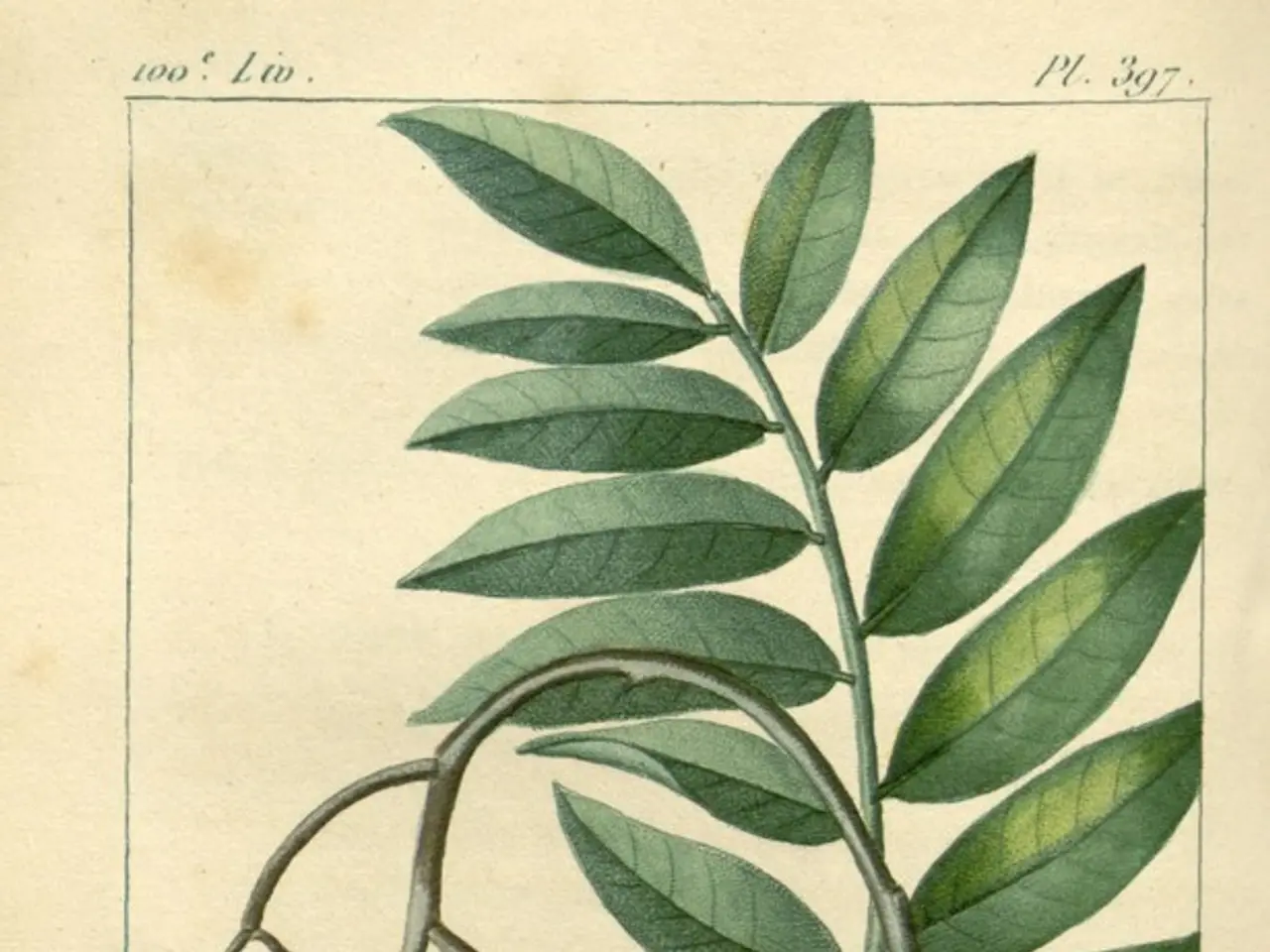Antioxidants: Nutrition Facts and Health Perks
In the ongoing battle against chronic diseases, antioxidants have emerged as potential allies. These substances, found in various foods and supplements, help neutralise free radicals, waste substances produced by the body and environmental pressures, which can cause oxidative stress and damage cells and organs.
Free radicals, often by-products of metabolic processes, can increase the risk of inflammation and various health issues, including cardiovascular diseases, neurodegenerative diseases, diabetes, cancers, gastrointestinal diseases, inflammatory conditions, and even the aging process. For instance, oxidative stress contributes to atherosclerosis by oxidising LDL ("bad") cholesterol, triggering immune responses that lead to fatty deposits narrowing blood vessels, increasing the risk of heart attacks and strokes.
Antioxidants, on the other hand, protect DNA, lipids, and proteins from oxidative harm, helping maintain normal cell functioning and reducing tissue damage. They support the body's redox homeostasis—the balance between oxidants and antioxidants—which is critical for preventing oxidative stress-related damage and systemic inflammation. Enzymatic antioxidant systems in the body, such as superoxide dismutase and catalase, and dietary antioxidants, like vitamins C and E, vitamin A, beta-carotene, lycopene, selenium, manganese, and various phytonutrients, help maintain this balance and mitigate damage to cells and organs.
However, it's important to note that while antioxidants are beneficial, high doses of antioxidant supplements can be harmful, and caution is needed regarding supplements. For example, a high intake of beta-carotene may increase the risk of lung cancer in smokers, and a high dose of vitamin E has been found to increase the risk of prostate cancer.
The best sources of antioxidants are plant-based foods, especially fruits and vegetables. Including a fruit or a vegetable in every meal and snack, drinking green or matcha tea daily, and adding foods with rich colours to the diet can help increase antioxidant intake. Examples of antioxidant-rich foods include tomatoes, watermelon (for lycopene), green and black teas, red grapes, dark chocolate, pomegranates, goji berries, and a variety of fruits and vegetables such as carrots, peas, spinach, and mangoes.
For people at risk of age-related macular degeneration, it is essential to seek advice from a doctor about whether to use supplements and which ones to use. Consuming fruits and vegetables has been linked to a lower rate of chronic diseases, but it is unlikely that consuming added antioxidants, especially in processed foods, will provide significant benefits.
In conclusion, while antioxidants play a crucial role in defending against oxidative damage and lowering the risks of chronic diseases, it's important to maintain a balanced diet and consult a health provider before making significant changes to your supplement intake. Eating a variety of antioxidant-rich foods, both cooked and raw, is key to maintaining good health.
- Ulcerative colitis, an inflammatory bowel disease, can be influenced by oxidative stress and may benefit from antioxidant intake.
- Multiple sclerosis, a neurodegenerative disease, might have its progression slowed down by antioxidants due to their protective effects on cells and organs.
- Other nutrition-related medical conditions, such as obesity and diabetes, could potentially be alleviated through a diet rich in antioxidants.
- Predictive models for heart disease might take into account the body's antioxidant balance as a factor in risk assessments.
- Depression, a mental health disorder, could potentially be linked to oxidative stress and may find relief in antioxidant therapies and treatments.
- The degeneration of the eyes, as seen in macular degeneration, could be slowed by antioxidants such as lutein, zeaxanthin, and vitamins C and E.
- Type 2 diabetes, a chronic metabolic condition, might be influenced by oxidative stress, making antioxidants beneficial in its management.
- Dry skin, a common skin condition, could potentially be improved through the use of antioxidant-rich skin care products.
- Crohn's disease, another inflammatory bowel disease, shares similarities with ulcerative colitis in its response to oxidative stress and potential benefits from antioxidants.
- Autoimmune disorders, such as lupus and rheumatoid arthritis, might experience alleviated inflammation through antioxidant supplementation and dietary changes.
- AQ, or ambient air quality, can contribute to oxidative stress, underscoring the importance of antioxidants in managing its health effects.
- Hepatitis, an inflammation of the liver, could potentially be mitigated through a balanced diet and appropriate antioxidant supplementation.
- Science continues to explore the role of antioxidants in various medical conditions, highlighting their potential in healthcare and medical-conditions research.
- Chronic diseases, including cancer, respiratory conditions, and digestive health issues, could be influenced by oxidative stress and may find relief in antioxidant therapies and treatments.
- Eye health, specifically the macula, could be protected against degeneration through a diet rich in antioxidants.
- Hearing loss, an auditory health issue, could potentially be linked to oxidative stress, making antioxidants a consideration for its prevention and management.
- Health and wellness, a holistic approach to lifestyle, could include an emphasis on antioxidant-rich foods for overall health benefits.
- Fitness and exercise, being essential for health, could be further enhanced by adequate antioxidant intake for improved recovery and reduced oxidative stress.
- As part of autoimmune disorders, atopic dermatitis could see improved symptoms through antioxidant supplementation and dietary changes.
- Diabetes, a metabolic disorder, could potentially be managed more effectively with an appropriate antioxidant balance.
- Vitamins, a crucial component of the human diet, function as both antioxidants and essential nutrients, underlining their importance in overall health.
- For pregnant women, maintaining a balanced diet rich in antioxidants can help support both maternal and fetal health.
- Immune health, a critical aspect of health and wellness, could potentially be bolstered by adequate antioxidant intake.
- Cardiovascular health, which can be impacted by oxidative stress, could be improved through a balanced diet rich in antioxidants.
- Industry, including manufacturing, retail, and finance, can play a role in promoting antioxidant-rich diets and sustainable practices.
- CBD, a compound known for its antioxidant properties, is gaining interest in the scientific community for its potential health benefits.
- Climate change, through its effects on air and water quality, can increase oxidative stress, underscoring the importance of antioxidants for environmental health.
- Renewable energy, as part of a sustainable future, could potentially reduce the overall oxidative stress caused by conventional energy sources.
- Men's health, a critical aspect of health and wellness, could benefit from antioxidant-rich diets and lifestyle choices.
- Skin care, an essential component of personal health and appearance, could be improved through the use of antioxidant-rich products.
- Therapies and treatments, both conventional and alternative, could potentially be enhanced by the inclusion of antioxidants for improved efficacy.
- Nutrition, being the foundation of health, plays a crucial role in antioxidant intake and overall health benefits.
- Women's health, a critical aspect of health and wellness, could benefit from antioxidant-rich diets and lifestyle choices.
- Parenting, as part of overall health and wellness, could potentially include a focus on antioxidant-rich foods for children's health benefits.
- Skin conditions, such as acne, could potentially be improved through the use of antioxidant-rich skincare products.
- Venture capital, a key player in the startup and innovation ecosystem, could invest in companies that focus on antioxidant research and development.
- Wealth management, being an essential part of personal finance, could potentially include strategies for optimization of antioxidant intake for overall health benefits.
- Aviation, as part of the transportation sector, could investigate the impact of high altitude on antioxidant balance and potential mitigation strategies.
- Leadership, in both business and government, could drive initiatives to promote antioxidant-rich diets and sustainable practices for overall health and wellness benefits.








